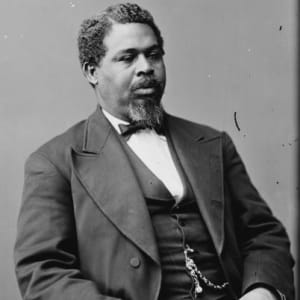One of the most intriguing stories of the Civil War is that of Robert Smalls, a slave and Civil War hero. The Confederacy employed him as a stevedore foreman, lamplighter, rigger, and sailor. On May 13, 1862, he and a black crew commandeered the CSS Planter, an ammunitions transport ship, and navigated it to the Union Navy blockade out of the Charleston harbor. Smalls was given an award by the Union of $1500 for his efforts.
Smalls became an instant northern celebrity, and the Union used this opportunity for propaganda to demoralize the South. Smalls spent the rest of the war as a spokesperson for African-Americans and piloting the Planter, and the ironclad Keokuk for the Union Navy. Smalls knew the South Carolina Sea Islands and made 17 engagements to advance the Union military campaign. Smalls received a commission as brigadier general of the South Carolina militia at the war’s end.
On June 7-8, 1864, he was a delegate to Republican National Convention. While waiting for repairs on the Planter, in the same year, he was removed from an all-white streetcar in Philadelphia on December 30, 1864. As a result, he organized the first mass boycott of segregated public transportation, and the city finally permitted integrated streetcars in 1867.
Robert received a rudimentary education from a private tutor while in Philadelphia and continued his education after the war in Beaufort, South Carolina. Among Small’s many accomplishments was opening a store, a school for black children, in 1867. In 1872, he published a newspaper, the Beaufort Southern Standard.
Robert’s popularity opened doors in South Carolina politics, and he was a delegate to the 1868 South Carolina constitutional convention. He served in the state senate from 1870 to 1874. Later in 1874, Smalls ran for the U.S. Congress and served five terms. He made a name for himself by openly speaking to defend his race and his party.
Smalls faced discrimination, spoke out against violence and intimidation of the Red Shirt militias (South Carolina’s Ku Klux Klan), and faced opposition throughout his political career. He won support by testifying that his supporters had been frightened away from the polls. After his last term in Congress ended in 1887, Republican President Benjamin Harrison appointed Smalls in 1889 as the collector at the port of Beaufort. He held that position until the Republicans lost the White House in 1892. He was reinstated to that position in 1898 by Republican President William McKinley. However, he was forced to step down in 1913 due to racism and segregation in Beaufort. Smalls died of natural causes in his Beaufort home on February 22, 1915.

